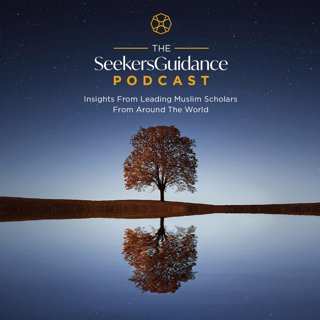
Embracing Excellence – 11 – Nurturing Faith – Shaykh Faraz Rabbani
In this episode, Shaykh Faraz Rabbani explores the chapter of Imam Haddad's Book of Assistance on Doctrine. He highlights the importance of learning one's beliefs (ʿaqidah) soundly and from reliable sources. He sheds light on ahl al-sunna wa'l-jamaʿa, the mainstream of Muslims, and warns against sectarianism. In this chapter, the author, Imam Haddad, explains how the traditional Ashʿari doctrine is that followed by the early Muslims as well as his own Ba-ʿAlawi tradition. He encourages studying a traditional statement of creed, recommending particularly that of Imam Ghazali. At the same time, he warns against delving too deeply into theology and philosophy, as faith is strengthened through reflection and righteous action. This is part of the series presented by SeekersGuidance Canada in Ramadan 2019. Check out the SeekersGuidance Ramadan Portal: www.seekersguidance.org/ramadan Help SeekersGuidance reach millions around the world through reliable knowledge and guidance from qualified scholars, completely free: become a monthly supporter - www.seekersguidance.org/donate Help SeekersGuidance support deserving scholars and students this Ramadan: give your zakat and charity to the Global Islamic Scholars Fund -- www.seekersguidance.org/donate
17 Maj 201951min

Embracing Excellence – 10 – Following the Book and Sunna – Ustadh Amjad Tarsin
Ustadh Amjad Tarsin explains the chapter of Imam Haddad's Book of Assistance on following the Qur'an and sunna. He highlights its centrality to faith and warns against innovations contradicting the sunna, while clarifying that this does not refer to everything not practiced by Prophet Muhammad (Allah bless him and give him peace). He also sheds light on the importance of connecting with scholars who can guide one to proper implementation of the teachings of the Qur'an and sunna. This lesson is brought to you by SeekersGuidance, the worlds first truly Global Islamic Seminary. Visit https://seekersguidance.org to access reliable Islamic knowledge, taught by qualified teachers. We offer a wide range of courses, podcasts, articles, and a world-class answers service, all completely free of charge. This is made possible solely by supporters like you. Be a partner in this blessed work by making a small donation at https://seekersguidance.org/donate , even $10/month can go a long way. Our Beloved Prophet (Peace and Blessings Be Upon Him) said, "Whoever guides someone to goodness will have a similar reward". So don't forget to share this lesson, and join us in spreading Prophetic Guidance.
17 Maj 201943min

03- The Art of Reading- Shaykh Ahmed Hussein El Azhary
In this new podcast series, Shaykh Ahmed Hussein El Azhary will discuss why the art of reading is critical for students of knowledge to master. One of the greatest barriers in mastering a science is the inability to read with structure and comprehension. In this series, Shaykh Ahmed will provide students with a detailed approach to rectifying this problem. In addition to offering practical tips and guidance in improving one’s reading and learning skills, Shaykh Ahmed will also elaborate on the development of the instrumental (foundational) sciences within the Islamic tradition and how they compare to medieval and modern theories of literary comprehension. In this third episode of The Art of Reading, Dr. Yusuf Patel asks Shaykh Ahmed El Azhary to provide a detailed methodology of reading a text. In addition to providing procedural steps to reading, Shaykh Ahmed highlights the critical need of the reader to build a relationship with the book and author. This relationship will allow the reader to build on what he or she has attained from the text, and facilitate the possibility of contributing to the subject matter. However, before a reader establishes a relationship with the author of a book, it is essential that the reader establishes a relationship with Allah and the Prophet (SAW), so that the reader may be a recipient of blessings and openings through the journey of acquiring knowledge. As in the previous two episodes, Shaykh Ahmed El Azhary continues to inspire us by sharing valuable and cogent insights in the discipline of Adab al – Mutala’ Biography of Shaykh Ahmed Hussein El Azhary: Shaykh Ahmed El Azhary is a researcher in Islamic intellectual history and a teacher of Islamic traditional sciences. He’s currently a teacher of Hadith, Usūl, Logic, and Kalam at Rawdatul-Na`īm under the supervision of Habib `Ali al-Jifrī; and at Madyafat Shaykh Ismaīl Sadiq al-`Adawī (RA), a prominent learning center by al-Azhar Mosque in Cairo. Formerly, Shaykh Ahmed worked as a Lead Researcher at Tabah Foundation. He was appointed by Habib `Ali al-Jifrī to architect the philosophical framework of Suaal initiative – an initiative concerned with modeling an Islamic philosophical response to contemporary existential questions, supervised by Shaykh `Ali Jumu`ah, Habib `Umar and Shaykh Usama al-Azhary. Shaykh Ahmed continues to participate in Suaal initiative through essays, public lectures, and workshops. Shaykh Ahmed studied Anthropology at American University in Cairo and received his training in Leadership Communication from Tulane University and The University of Alabama at Birmingham. He is also a life-long learner. He holds a diversified portfolio of almost 50 certificates in a variety of subjects – extending from Teaching Character and Clinical Psychology of Children and Young People to Complexity Theory, Model Thinking and Conflict Analysis. Shaykh Ahmed began his journey of studying traditional sciences about 20 years ago. In addition to studying with scholars from al-Azhar, he had the privilege of studying with visiting scholars from Algeria and India in a one-on-one format and was thus given an exceptional opportunity to study and discuss advanced-level texts of different sorts and over a long period of time. Shaykh Ahmed has more than 70 Ijazas from scholars from all over the Muslim world.
16 Maj 201940min

Embracing Excellence: 30 Steps on the Straight Path- 09- Reflection -from Imam Haddad’s Book of Assistance – Shaykh Faraz Rabbani
In this session, Shaykh Faraz looks at the section on reflection from Imam Haddad's Book of Assistance. He first explains the centrality of reflection to religious practice. Next, he explores the various types of reflection -- reflecting on Allah's creation, His favours, His encompassing knowledge of one, one's shortcomings, the paltry nature of this world, death, the virtues mentioned in the Qur'an, and on the Divine names and attributes -- citing the relevant verses and hadiths related to them. This is part of the series presented by SeekersGuidance in Ramadan 2019.
16 Maj 201958min

Embracing Excellence: 30 Steps on the Straight Path- 08- Remembrance -from Imam Haddad’s Book of Assistance – Ustadh Amjad Tarsin
Ustadh Amjad Tarsin continues exploring Imam Haddad’s Book of Assistance as part of the series “Embracing Excellence: 30 Steps on the Straight Path.” In this session, he covers the chapter on remembrance. He explains the importance of remembrance from the Qur’an and hadith, as well as the importance of having a set litany of remembrance which one performs. Ustadh Amjad sheds light on some of the proprieties of remembering God, particularly that it involves both the tongue and heart. He also mentions many Prophetic invocations (adhkar) to be performed throughout the day, offering useful tips on how to bring these into one’s life. He closes with some of the virtues of sending prayers on the Messenger of Allah (peace and blessings be upon him). This is part of the series presented by SeekersGuidance in Ramadan 2019 This is made possible solely by supporters like you. Be a partner in this blessed work by making a small donation at https://seekersguidance.org/donate , even $10/month can go a long way. Our Beloved Prophet Muhammad (Allah bless him and give him peace) said, "Whoever guides someone to goodness will have a similar reward". So don't forget to share this lesson, and join us in spreading Prophetic Guidance
14 Maj 201934min

Embracing Excellence – 07 – Acquiring Knowledge – Ustadh Amjad Tarsin
Ustadh Amjad Tarsin moves on to look at Imam Haddad’s chapter in the Book of Assistance on acquiring knowledge. He sheds light on the three core sciences necessary for the Muslim to understand and operationalize the Qur’an and sunna — beliefs (ʿaqida), sacred law (fiqh), and spiritual purification (tasawwuf) — in addition to hadith and Qur’anic commentary. He discusses the importance of gaining a sound foundation in sacred learning and recommends the practical writings of Imam Ghazali in particular. He cautions against reading high-level Sufi works (such as those of Ibn ʿArabi) which can be easily misunderstood leading to religious deviation.
13 Maj 201934min

Embracing Excellence: 30 Steps on the Straight Path- 06 – Reciting the Qur’an – Shaykh Faraz Rabbani
Shaykh Faraz Rabbani continues the series "Embracing Excellence: 30 Steps on the Straight Path" exploring Imam Haddad's Book of Assistance. In this episode, he explores the chapter on reciting the Qur'an This is part of the series presented by SeekersGuidance Canada in Ramadan 2019.
12 Maj 201948min

Reconnecting with the Quran in Ramadan – Shaykh Faraz Rabbani
Shaykh Faraz Rabbani reminds of the gift of the guidance of the Qur'an, which provides the answers to the fundamental questions of life. He advises that we use Ramadan to reflect on the gift of the Quran and reconnect with Allah's Book, and reminding of the great rank and virtue of "the people of the Qur'an" described in Prophetic traditions. Shaykh Faraz advises that we establish a sustainable goal of recitation of the Quran in Ramadan that we maintain after. He encourages us to take advantages of opportunities to recite, listen, and learn the Qur'an for eternal joy. He closes by giving pointers on how we should make our relationship of the Qur'an a relationship of love. This lesson is brought to you by SeekersGuidance, the world's first truly Global Islamic Seminary. Visit https://seekersguidance.org to access reliable Islamic knowledge, taught by qualified teachers. We offer a wide range of courses, podcasts, articles, and a world-class answers service, all completely free of charge. This is made possible solely by supporters like you. Be a partner in this blessed work by making a small donation at https://seekersguidance.org/donate. Even $10/month can go a long way. Our Beloved Prophet (peace and blessings be upon him) said, "Whoever guides someone to goodness will have a similar reward". So don't forget to share this lesson, and join us in spreading Prophetic Guidance.
11 Maj 201927min





















